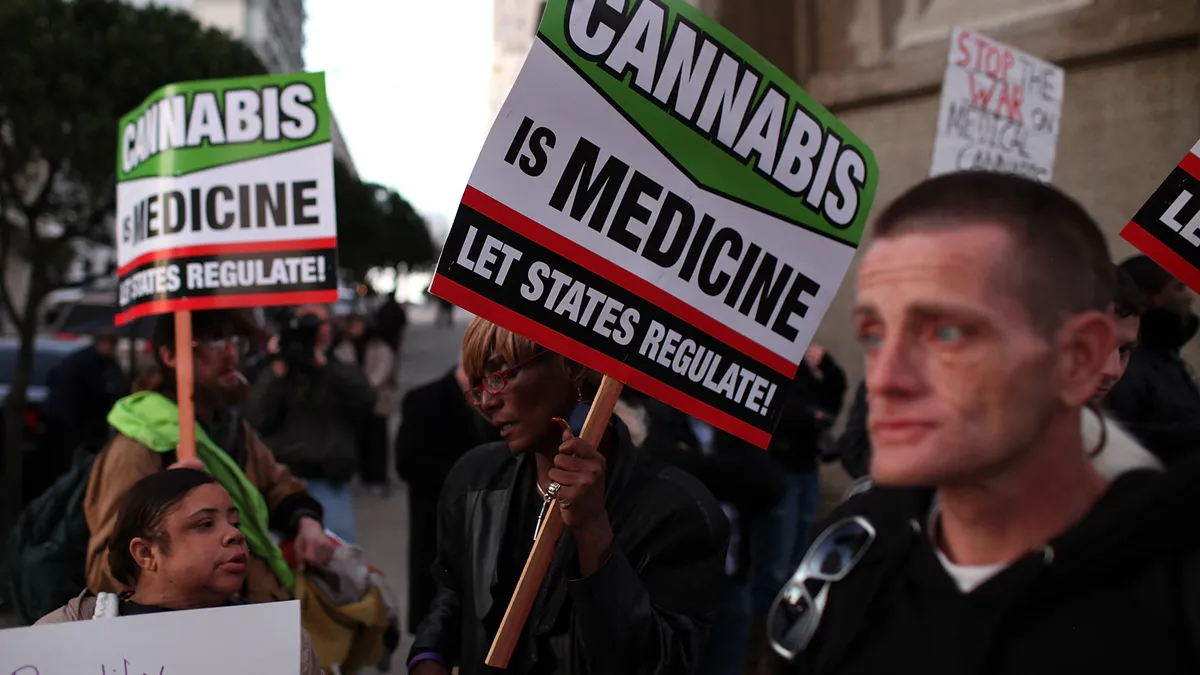Dive Brief:
- The New Jersey Supreme Court unanimously ruled that a contractor must pay the medical marijuana bills of a former employee who was injured on the job under state workers’ compensation law, and that doing so doesn’t subject the company to criminal liability even though marijuana is still illegal at the federal level under the Controlled Substances Act.
- The April 13 decision upheld an appellate ruling from last year that ordered M&K Construction to pay for the medical marijuana its former employee, Vincent Hager, uses to treat leg and back pain from a work injury sustained in 2001 when a truck dumped cement on him, resulting in a herniated disc, according to court documents.
- The court ruled since M&K was being ordered to pay for the worker’s pot, and that the firm had appealed the decision, the company couldn’t be shown to intentionally be aiding and abetting Hager’s possession of marijuana contrary to the federal CSA. “Reimbursing Hager under court mandate can hardly be interpreted as M&K ‘elect[ing]’ to aid in Hager’s possession of marijuana, contrary to federal law,” wrote Lee A. Solomon, associate justice, in the court’s decision. “Rather, it is being compelled to do so by the order.”
Dive Insight:
The case could have wide-ranging implications for other employers in New Jersey — and potentially other states — by simultaneously putting employers on the hook for workers’ medical marijuana costs, while at the same time giving companies legal cover from willingly violating federal law.
A total of 36 states and four territories now have medical marijuana laws on the books, according to the National Conference of State Legislatures.
In the New Jersey case, M&K Construction argued that Hager’s injury wasn’t covered under New Jersey’s Compassionate Use Act, which legalized medical marijuana use in 2010, because the law doesn’t require private health insurers or government medical assistance programs to cover the costs of medical marijuana. But the court ruled that since the case was actually a workers’ compensation claim, M&K could be required to pay for Hager’s pot, which costs around $616 per month.
According to court documents, Hager had numerous surgeries after the accident and was prescribed opioids, which he eventually became dependent on. A doctor noted that he qualified for medical marijuana in 2016, which ultimately helped him to stop taking the opioids.
Opioid use has become an intransient issue in the construction industry in recent years. The physical wear and tear of construction work on workers’ bodies can lead to increased reliance on painkillers, and construction workers have been found to engage in riskier behavior off the job than employees in other industries.
Workers' compensation attorney Jennifer Brennan, a partner at Chartwell Law in Moorestown, New Jersey, wrote in a post on legal knowledge site JDSupra that the pairing of medical marijuana and opioids could broaden the impact of this case even further.
“This recent decision has significant implications for employers in New Jersey,” Brennan wrote. “There are likely to be other such orders entered compelling employers to provide reimbursement for medical marijuana if… there is competent evidence presented by an employee showing its ability to restore some of the worker’s function or to cure or relieve the effects of the injury. This is likely to become more prevalent, particularly in cases where there is a question of medical marijuana also being used to wean off opioids, as was seen in the Hager case.”
Matthew Collins, co-chair of the labor and employment law practice at Brach Eichler in Roseland, New Jersey, said the case could have repercussions beyond the state as well.
"In other states that have legalized medicinal marijuana, this decision could be a basis for requiring employers to reimburse the costs of medical marijuana used to treat a workers’ compensation injury," Collins wrote in an email to Construction Dive. Because the decision effectively suspended the CSA, Collins said it could also be cited in other states to make the argument that "an employer cannot terminate an employee who tests positive for using medical marijuana where such usage was permitted under state law as a treatment for the employee’s disability.”
Editor's note: This article was updated to include comments from attorney Matthew Collins.














